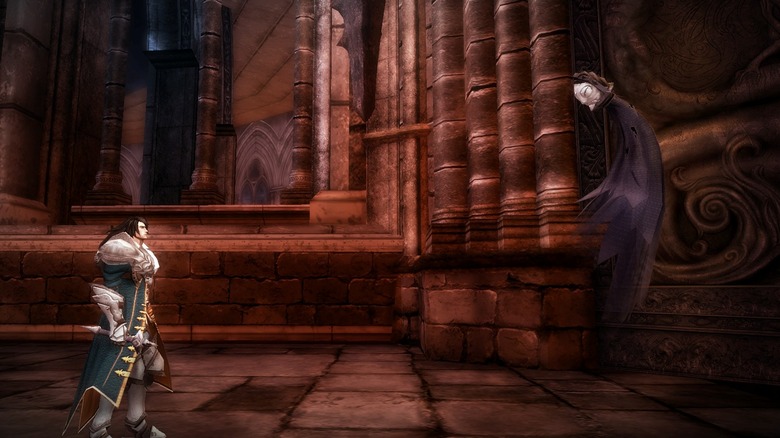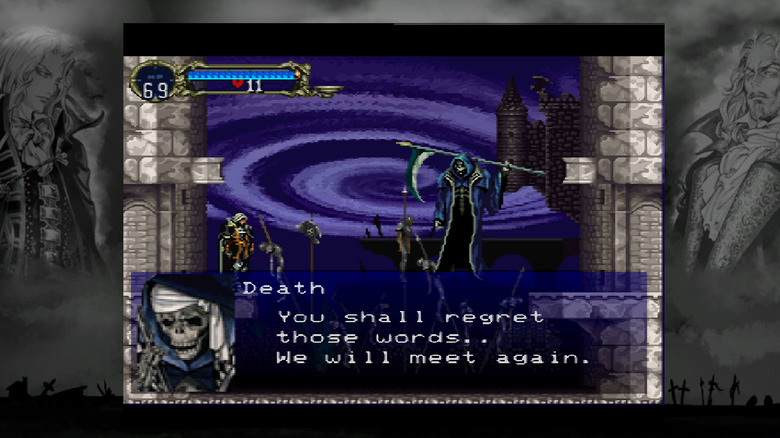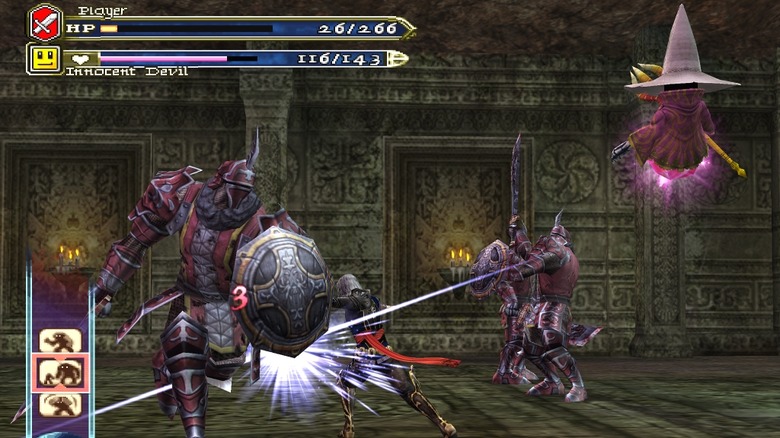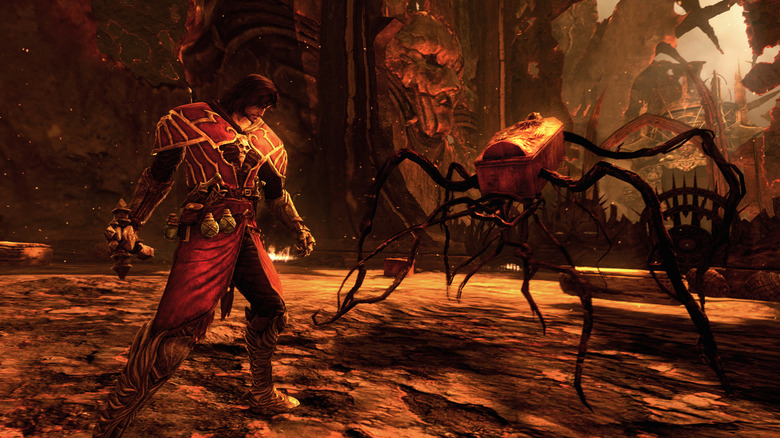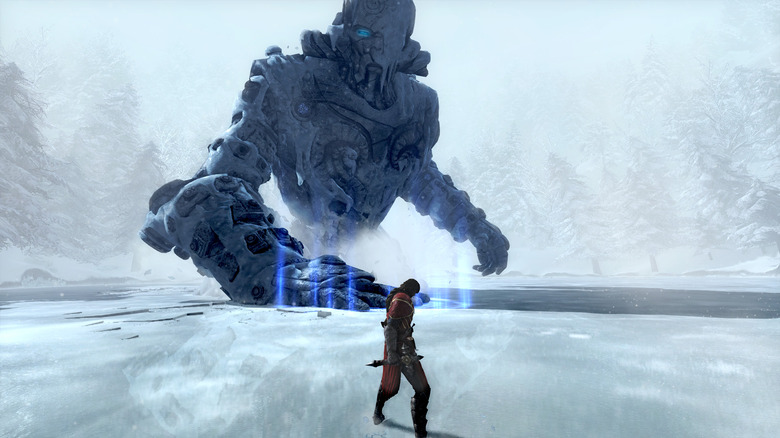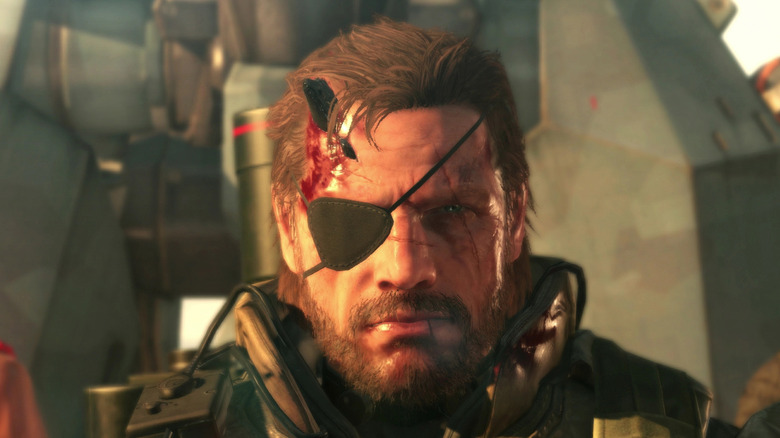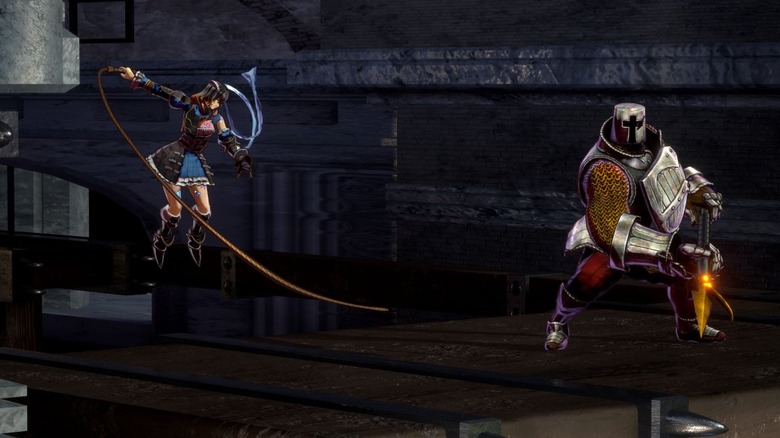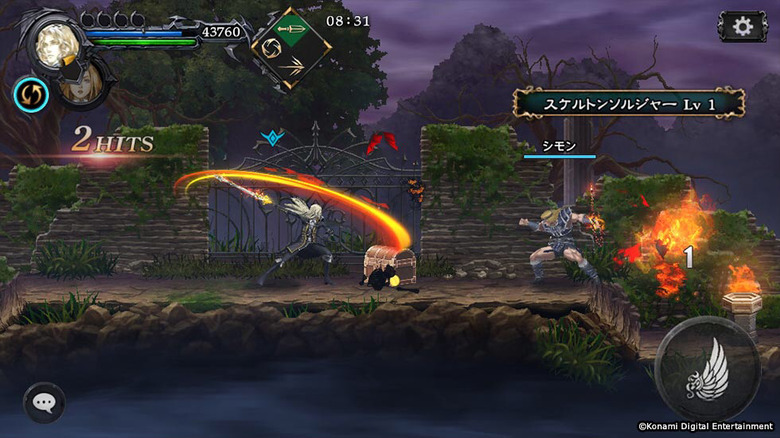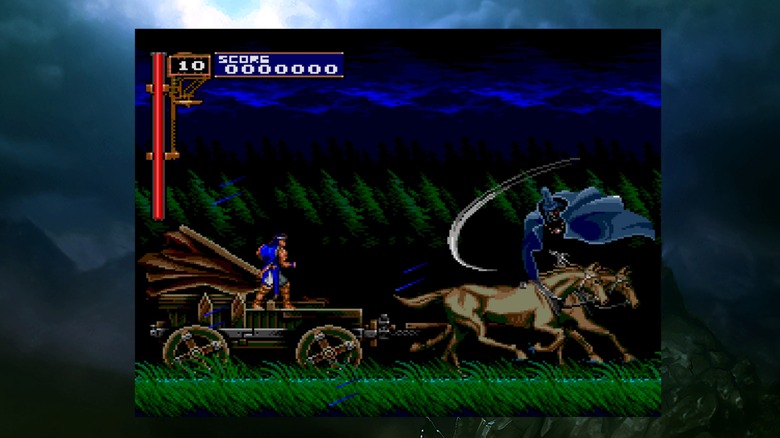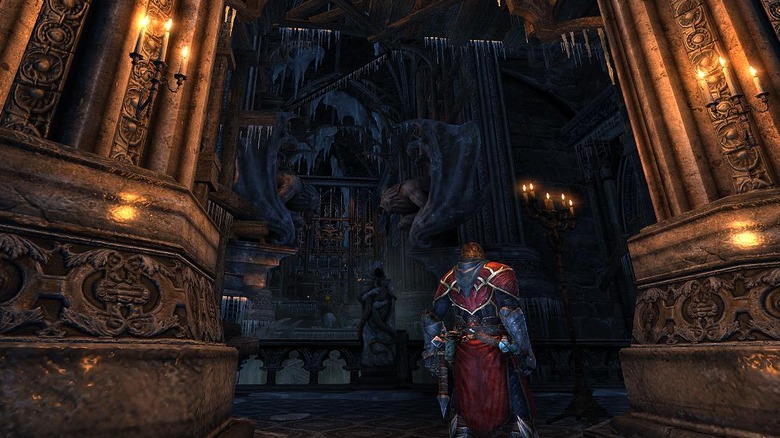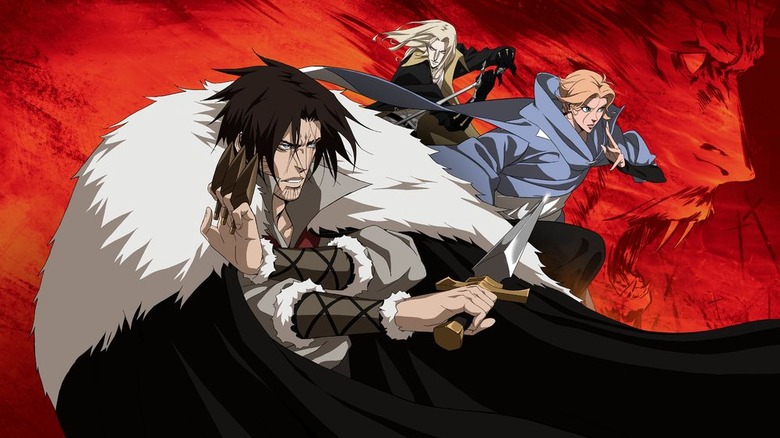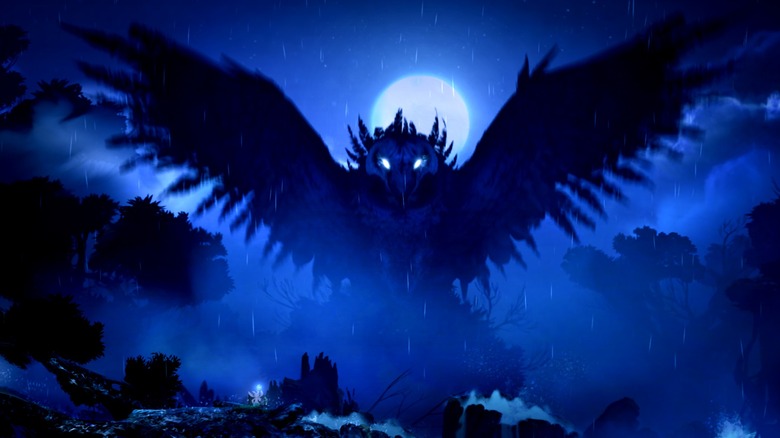Why Konami Won't Release Another Console Castlevania
The Castlevania series is one of the classics of gaming. The original game first appeared in 1986, and the Belmont clan has been hunting bloodsuckers ever since. All told, there have been dozens of Castlevania titles across nearly every imaginable platform. The series has been included on both the NES Classic and SNES Classic, appearing alongside Nintendo's own historic characters and worlds. It's a game series that has endured its ups and downs and has withstood the test of time, and it always seems like a solid choice for a classic revival.
However, fans' requests to Konami have fallen on (mostly) deaf ears. It seems unlikely that a big-budget, console Castlevania will be headed down the pipe in the foreseeable future for a number of reasons. Never say never, but we wouldn't hold our breath for a new entry in the series any time soon. Here are the reasons why Konami is not hitting the gas on a new console Castlevania.
For better or worse, Symphony of the Night has cast a huge shadow over Castlevania
Let's get the obvious out of the way: when most fans clamor for a new Castlevania title, they want a new Symphony of the Night. The 1997 PlayStation title helped to define the direction of the series and even co-established the name of the genre: Metroidvania, along with Nintendo's Metroid franchise. Giant Bomb writes that, even though games in the "2D side-scrolling action title with exploration elements" existed long before 1997, Symphony of the Night is the title that defined the genre, as the word "Metroidvania" became common nomenclature not long after its release.
Kotaku calls Symphony of the Night "the Castlevania game that changed everything." It was and still is beloved, with near-universal acclaim from both critics and fans alike, and it has seen ports on various platforms since its release. It has cast a looming shadow over the series, one that is practically impossible to escape from beneath. It's one of those classics that will be tough to ever live up to. And the franchise never really has, despite the flood of games that followed Symphony.
Bad entries have repeatedly derailed the series
After Symphony of the Night, the Castlevania series was riding high. The new technology available on the PlayStation and Nintendo 64 meant that the next entry in the series would be even bigger and better, right? Not so fast.
The first official Castlevania title after Symphony of the Night was Castlevania: Legends. It came out on the original Game Boy, and is the lowest-rated title in the series. After that, the maligned Nintendo 64 titles were released. The first received some average ratings, but the second of those titles, Legacy of Darkness, received a critical shellacking upon release. Castlevania was not continuing a hot streak in the late '90s.
In fact, that seems to be the name of the game with Castlevania. Whenever a critically acclaimed title releases, it is quickly followed by a deflating release that kills a lot of the hype surrounding the series. After 2005's Dawn of Sorrow, we got Curse of Darkness. After The Dracula X Chronicles, Konami released Judgment.
Luckily, a new branch in the Castlevania franchise, Lords of Shadow, seemed like it was going to revitalize the series.
The latest reboot started well and quickly fell off
With the fits and starts that the Castlevania series was going through, Konami decided it was time for a change. The longtime lead of the series (and brains behind Symphony of the Night), Koji Igarashi, was shifted to another part of the company, and the reins were handed over to different creative directors. This new branch of the Castlevania series was called Lords of Shadow.
And it was good! However, like we've already seen with Castlevania, that success would not last.
The first Lords of Shadow game was met with extremely positive reviews; it wasn't Symphony of the Night, but it was a good new direction for the series. The sequel, Mirror of Fate, slipped a bit, and the true follow-up, Lords of Shadow 2, just could not live up to the lofty perception of Castlevania. True fans wanted a side-scrolling sequel worthy of Symphony of the Night, but Konami was going through too much turmoil to make that happen.
Konami went through some seriously bad press
Kotaku writes that, about the time the first Lords of Shadow game came out, something strange was happening at Konami. A mobile title called Dragon Collection was making a tremendous return on a relatively small development cost, and big-budget titles were starting to look less appealing to the people in charge. The corporate culture in some of the bigger branches of the studio began to suffer as a result.
The report from Nikkei that Kotaku referenced indicates some awful working conditions. Cameras were installed not for security reasons, but to monitor employee movement. Staff that were deemed no longer viable were reassigned as security guards or manual laborers, rather than being laid off. Members of the staff that expressed support for an employee who was leaving the company were shuffled into less desirable positions.
Overall, it sounds like something straight out of 1984. And that doesn't even scratch the surface of how Konami treated some of its most well-known creators.
Konami alienated its most beloved creators
Unless you were completely outside of video game culture in 2015, you probably heard about the saga between Konami and Hideo Kojima. The maestro of the critically-acclaimed Metal Gear Solid series, Kojima fell out hard and fast with his own company. The studio removed his name from Metal Gear Solid 5, and makes practically no mention of him creating the game. Polygon writes that Konami restricted internet and communication access for senior members of Kojima's team, and it wasn't long before he was out of the company, working on a new IP.
Another beloved creator, Akira Sakuma, also feuded with the company. Sakuma was responsible for the Momotaro Dentetsu series and, after Konami took over developer Hudson, got into a very public spat with the company. Forcing out fan-favorite creators was yet another indicator that the corporate culture at Konami was suffering.
This brings us back to Koji Igarashi, the man behind Symphony of the Night and several of its follow up titles. He also does not seem like he escaped Konami's lashing out at creators.
The brains behind the series left to pursue his own ventures
Koji Igarashi, known by his fans as "Iga," helped bring several fan-favorite Castlevania titles to life, including Symphony of the Night. He did not escape Konami's dramatic corporate shift, however, and left the company in 2014. IGN writes that his main reason for leaving was the way the company had treated its employees.
Iga claimed to understand Konami's pursuit of money, as any corporation does. However, Iga's agent also said this about his decision to leave: "As a top-level creator who also was put in difficult situations in which he had to make difficult choices, it's always sad when really interesting franchises or really talented creators end up not being able to make the thing they've made in the past that has made the fans so happy, speaking brutally honest, that has generated revenue in the first place. So for him, it's kind of a sad day to see that's happening."
Kotaku writes that Iga left the company after 24 years, and that Konami moved him to the development of social games after moving him off the Castlevania games. His first project outside of Konami was, naturally, a spiritual successor to Symphony of the Night called Bloodstained.
The lure of the mobile market is strong
Konami's decision to move away from big-budget console games seems to be, in part, due to the growth of the mobile game market. Part of it dates back to the 2010 release of Dragon Collection, but small-budget mobile games raking in massive amounts of money has to be an enticing prospect for any gaming company.
That siren's song has not gone unheard in the hallowed halls of Castlevania. If you are desperate for anything related to the series, there is a brand-new title coming soon. To iOS. In Japan. At some point.
Castlevania: Grimoire of Souls is a 2D, side-scrolling Castlevania title, featuring both four-player co-op and competitive play. The closed beta occurred in early 2018, but it was also exclusive to Japan. Konami has been fairly tight-lipped about Grimoire of Souls since then, but they have been adamant that it is an iOS exclusive and not headed to consoles.
The rerelease temptation is also strong
Rereleases are a perfect solution for Konami's approach to Castlevania. Rather than suffering through a long development cycle and unknown fan reception, they can simply port their most beloved titles to new platforms and rake in the dough. We've already talked about the inclusion of Castlevania titles on the NES Classic and SNES Classic, and nearly every well-received game in the series has seen release on multiple platforms.
For example, in 2018, Konami put together Castlevania Requiem, a two-for-one package that includes both Symphony of the Night and Rondo of Blood. It released for PlayStation 4 for $19.99. If you check a list of Castlevania titles, you can see that nearly every single one has been brought to several consoles through rereleases, ports, and collections. For Konami, this seems like a better bet than actually developing new games — something they were once pretty well known for.
Konami is making more money by transitioning to other areas
You may be thinking, "Sure, they can make a bit here and there by rereleasing Symphony of the Night onto a dozen different platforms, but Konami's bottom line has to be suffering from their new business plan."
You'd be wrong.
Konami's focus on mobile games, pachinko machines, and gyms (yes, gyms) has worked wonders for their bottom line. Eurogamer writes that their December 2016 profits were 70 percent higher than the previous year. Kotaku writes that those profits came from a decrease in development cost; total revenue actually decreased over that time period. However, the lack of massive console titles most likely drove down overhead costs.
Cinema Blend writes that, as Konami started to transition away from big-budget console titles, many of their "old guard" higher-ups began to leave the company as well. It seems unlikely that the company will shift its focus back in that direction any time soon.
That means there are just a few options remaining for diehard Castlevania fans.
The Netflix series is telling solid enough stories
One option available to fans of Castlevania lies in the Netflix animated series. The first season was generally well-received: it boasted a strong animation style but did not have a lot to say with just a four-episode run.
Decider writes the the second season of the show was able to tell a much more intricate and nuanced story than the first. Writer Kayla Cobb says that the second season of the show "transforms into something more interesting than a collection of awesome scenes. In its second season Castlevania sternly questions whether humanity is worth saving. The answer isn't as cut and dry as one may think."
Netflix executives obviously agreed. Polygon writes that writer and producer Warren Ellis will return to the series for a third season. He will be continuing the story of Castlevania 3: Dracula's Curse, following Trevor Belmont and his attempt to defeat Dracula. We don't know yet when the third season will premiere, but it seems likely we will see it sometime in 2019.
Indie games are doing the series just as well, if not better
If you aren't too hung up on it being a true Castlevania game, you actually have several options available to you right now. One of the benefits of Symphony of the Night making such an impact on so many gamers and essentially creating a new genre is that plenty of indie developers have made valiant efforts at crafting their own version of the classic.
We're saying that there are a lot of good Metroidvania titles for gamers to choose from.
Dead Cells has a 90/100 critical average on Metacritic, and is regarded as a perfect blend of the roguelike and Metroidvania genres. Ori and the Blind Forest has an 88/100 critical average, and is praised for its beautiful art direction and beguiling difficulty. Hollow Knight's hand-drawn art style and compelling world won over critics and fans alike. Owlboy's character designs and perfect controls helped put together an 88/100 critical average.
This is by no means a definitive list, but we're trying to tell you that there are a lot of options available if you're a Castlevania fan. Give one a shot, and compare it to Symphony of the Night. You may be pleasantly surprised.

